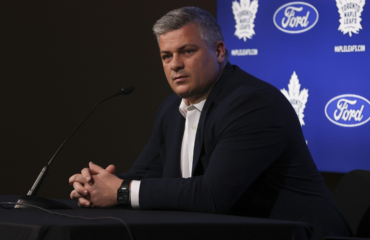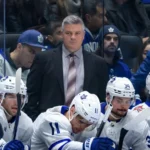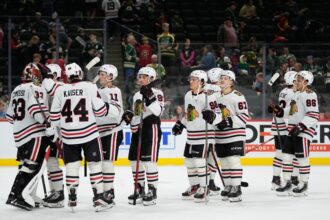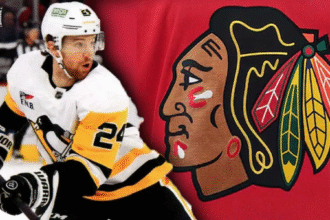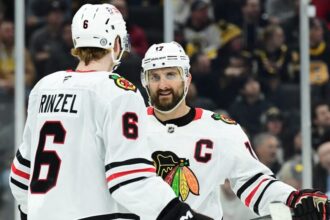The Toronto Maple Leafs have struggled to find their rhythm this season. Despite starting as a work-in-progress due to a challenging summer, they failed to make significant progress during the season. There were moments when it seemed like coach Keefe was on the verge of being fired, only for the team to stage remarkable comebacks and embark on winning streaks. One memorable instance was an early-season game in Tampa, where they rallied from a three-goal deficit in the first period to secure a crucial victory.
At various points, the team appeared to urgently need a goaltender and a defenseman, yet no action was taken. It was unprecedented to see a team with championship aspirations remain inactive in addressing its deficiencies throughout the season.
Despite boasting five superstars and a strong supporting cast of scorers, the Leafs enjoyed a successful stretch, winning over 70% of their points in 28 games and leading the league in scoring. However, their impressive run was paralleled by other competitive teams, resulting in the loss of the Atlantic Division title and the risk of slipping into a Wild Card spot, which would be a humiliating setback.
Although anything can happen in the unpredictable Stanley Cup Playoffs, the Toronto Maple Leafs don’t appear to be strong contenders for the championship. Perhaps by expressing these doubts, there’s a chance of reversing their fortunes, and this premature list of regrets may come back to haunt if they indeed clinch the Cup.
5 Regrets the Toronto Maple Leafs Will Have This Summer
5. Hiring Brad Treliving
The discussion surrounding Kyle Dubas has become frustrating as he’s been elevated to a quasi-political status, leading to biased and outlandish opinions that hinder reasonable discourse about him.
Nevertheless, the Leafs took a chance on grooming a young manager, allowing him to learn on the job. Just as he was poised to leverage that experience, he departed for another team.
Dubas stirred controversy because a billion-dollar franchise entrusted a young leader with their team and permitted him to innovate in an industry resistant to change. It was a remarkable and unprecedented situation, dampened only by unfortunate circumstances that prevented success, which some took personally.
Despite this, Dubas had his tenure, and while some preferred he stayed, there’s acceptance in moving forward. Yet, transitioning from the forefront of NHL innovation to a more conventional role feels like a step backward.
In contrast, Treliving adheres to conventional hockey wisdom, evident in his management style. Additionally, he’s currently managing two underperforming teams, although Dubas’s departure left him with a strong roster and ample financial resources.
If the Leafs fail to advance past the first round, there’s a silver lining: the incoming MLSE President may dismiss Shanahan, potentially leading to Treliving’s departure as well. While winning the Stanley Cup or a prolonged playoff run is preferable, this outcome offers some solace.
Critics argue that Treliving’s management decisions have been detrimental, particularly considering he oversaw one of Auston Matthews’ prime seasons.
It’s regrettable that Dubas lost the power struggle; his potential without Shanahan’s interference remains unknown and intriguing.
4. Summer Spending
What on earth was Brad Treliving thinking last year, or at least, who was guiding him?
Opting for a one-year deal with Tyler Bertuzzi showed intelligence, but the other moves fell short.
Max Domi’s limited skills confine him to specific roles, and John Klingberg’s decline, exacerbated by age and injury, makes his signing regrettable. It’s a widely held belief in hockey that players, save for ex-Leafs apparently, don’t typically improve after 30.
Klingberg’s contract might be remembered as one of the franchise’s worst decisions.
The signing of Ryan Reaves remains a glaring misstep. Even a one-year deal at league minimum would have been hard to justify, but committing more money and extending it to three years is egregious. It’s the sort of move that might have surprised even David Clarkson’s agent.
Elevating David Kampf to the highest-paid fourth liner in the NHL was a questionable decision at best. However, foregoing any improvements to the blue line and starting the season with Samsonov and Woll as the primary goaltenders was even more misguided.
Treliving’s summer signings were underwhelming, and the subsequent season only compounded the disappointment. The team’s success appears to be despite their GM, not because of him.
3. Not Trading William Nylander At His Absolute Peak
Among all the actions or inactions of the Toronto Maple Leafs in the past year, there’s one decision they’ll likely rue more than any other: their failure to bolster their blue-line.
The Leafs brought in Klingberg during the summer with the belief that another defenseman adept at moving the puck would greatly benefit the team in its current state. This was a logical, and in my opinion, correct assessment.
However, their choice of Klingberg was flawed, though he represented the type of player they required – just in a healthier condition.
Even with a fit Klingberg, the Leafs’ blue-line still fell short of matching up with the league’s top-tier defenses. Yet, their most perplexing move was not finding a replacement when Klingberg got sidelined.
While the Leafs acquired Joel Edmundson and Ilya Lyubushkin, both known for their defensive prowess, their lack of offensive contribution and a tendency to be pinned in their own end largely counterbalanced their value. If they did improve the Leafs’ blue-line, it wasn’t by a significant margin.
The absence of a superstar defenseman and the overall deficiency in mobility and puck-moving abilities highlight a glaring weakness in the Leafs’ defensive lineup. Considering the strength of the team’s forwards, relying on such an obvious deficiency throughout the season appears to be a major misstep.
While expecting management to perform miracles is unrealistic, I don’t believe it’s asking too much to bring in players markedly superior to Lyubushkin or Edmundson.
2. Not Upgrading the Blue-Line
Among all the actions taken or neglected by the Toronto Maple Leafs in the past year, there is one decision they’ll rue more than anything else: their failure to bolster their defensive lineup.
During the summer, the Leafs secured Klingberg with the hope that another defenseman adept at moving the puck would greatly benefit the team in its current state. This was a logical, and in my view, accurate evaluation.
However, the Leafs erred in their choice of Klingberg specifically, though he embodied the kind of player they required—albeit in better health.
Even with Klingberg fit, the Leafs’ defensive line remained inferior compared to the top ones in the league. Yet, their most perplexing move was their failure to replace Klingberg when he was sidelined.
They brought in Joel Edmundson and Ilya Lyubushkin, both formidable opponents but lacking in offensive prowess and often trapped in their defensive zone. While they may marginally improve the Leafs’ defensive line, it’s not a significant upgrade.
The Leafs’ defense lacks a standout superstar and is deficient in mobility and puck-handling skills overall. Considering the quality of the team’s forwards, relying on such an obvious weakness throughout the season was a major misstep.
While expecting management to perform miracles is unreasonable, demanding players significantly superior to Lyubushkin or Edmundson isn’t an extravagant request.
1. Not Getting a Goalie
The Maple Leafs’ management will likely rue their decision not to acquire a goalie, which stands out as their most significant oversight once the team inevitably falls short in the playoffs.
While Joseph Woll shows promise, he lacks experience, having played only sporadically over the past four years and facing issues with injuries. While it’s reasonable to give him a chance, it’s baffling not to invest heavily in another goalie, especially with two franchise legends in their prime. The team’s current goalie on minimum salary doesn’t justify avoiding a substantial investment in this crucial position.
Given the Leafs’ win-now mentality, relying on a rookie goalie and another player they were hesitant to commit to long-term (a decision that appears wise in hindsight) is an unnecessary risk. While elite goalies are elusive and their performance unpredictable, the potential payoff justifies the pursuit, as having a top goalie is arguably the most valuable asset a team can have.
Financial constraints aren’t a valid excuse, considering the ample salary cap space available to them. They could have easily freed up additional funds by trading players like Kampf, Domi, or Brodie. The Leafs’ failure to secure a reliable goalie has left them ranked 22nd in overall save percentage, despite their respectable standing in points percentage.
Their ability to perform well despite subpar goaltending indicates the potential for greatness with top-tier or even average goaltending. While they might stumble into a Stanley Cup victory this season, their failure to acquire a top goalie means they won’t enter the playoffs as serious contenders.
